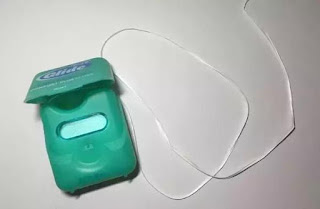 Recently, we came upon an article, 17 Health Advances Every Woman Deserves to Know released by the editors of the Harvard Woman's Health Watch.
Recently, we came upon an article, 17 Health Advances Every Woman Deserves to Know released by the editors of the Harvard Woman's Health Watch.One of the 17 concerns was: does flossing really matter? The simple answer: yes, it does. It reads as followed: A recent report has some people thinking there's no benefit to flossing. But before you toss your floss, consider this: flossing helps prevent periodontal disease, which is linked to higher risk of diabetes, heart disease and dementia. What's more, gum disease is also associated with a greater risk of serious degenerative diseases. To avoid periodontal disease make sure you brush your teeth at least twice a day AND floss before bedtime, eat a healthy diet and have regular dental check ups.
 We often get patients that unfortunately don't floss or we get patients that say they do but their teeth tell different stories. Endodontists are known for being the heroes and heroines of saving teeth so we can't express enough how important flossing really is. Even if you don't like it, please floss at least once a day. It's helps remove plaque from the areas between your teeth. Plaque, combined with the sugars of the foods that we eat, case tooth decay. This leads to cavities, in worse situations it leads to root canal treatment, but if no treatment is done it ultimately leads to badly infected teeth that result in one losing a tooth. Also, as the article mentioned it could lead to gum disease and it increases your chance of developing heart disease and dementia.
We often get patients that unfortunately don't floss or we get patients that say they do but their teeth tell different stories. Endodontists are known for being the heroes and heroines of saving teeth so we can't express enough how important flossing really is. Even if you don't like it, please floss at least once a day. It's helps remove plaque from the areas between your teeth. Plaque, combined with the sugars of the foods that we eat, case tooth decay. This leads to cavities, in worse situations it leads to root canal treatment, but if no treatment is done it ultimately leads to badly infected teeth that result in one losing a tooth. Also, as the article mentioned it could lead to gum disease and it increases your chance of developing heart disease and dementia.All in all, as distasteful as it is to floss, it's very important to do so, at least once a day. Floss before going to bed or when you have a moment at work. It's just not worth losing your teeth, developing a habit of flossing will help with overall health and keep you smiling all day, everyday.
Comments
Post a Comment